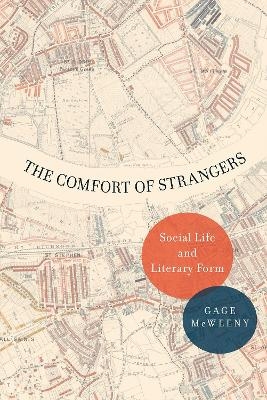
The Comfort of Strangers
Social Life and Literary Form
Seiten
2019
Oxford University Press Inc (Verlag)
978-0-19-088742-1 (ISBN)
Oxford University Press Inc (Verlag)
978-0-19-088742-1 (ISBN)
The Comfort of Strangers argues for a new understanding of the relation between literary form and the socially dense environments of modernity. In a period of vast population increase in Britain, literary form imagined and licensed new ways of being with, and getting away from, other people.
In most accounts, literature of the nineteenth century compulsively tells the story of the individual and interiority. But amidst the newly dense social landscapes of modernity, with London as the first city of one million inhabitants, this literature also sought to represent those unknown and unmet: strangers. Focusing on the ways that both Victorian literature and modern social thought responded to an emergent "society of strangers," The Comfort of Strangers argues for a new relation between literary form and the socially dense environments of modernity, insisting upon strangers in these works not as alienating, fearsome others, but a relatively banal yet transformative fact of everyday life, the dark matter of the nineteenth-century social universe.
Taking up "the literature of social density," Gage McWeeny engages with a range of generically diverse works from the age of Victorian sympathy to illuminate surprising investments in ephemeral relations, anonymity, and social distance. Life amidst strangers on urban streets and markets produced new social experiences, both alluring and fearsome, and McWeeny shows how realist literary form is remade by the relational possibilities offered by the impersonal intimacy of life among those unknown and the power of weak social ties. Reading works by Charles Dickens, Matthew Arnold, George Eliot, Oscar Wilde, and Henry James, he discovers a species of Victorian sociality not imagined under J.S. Mill's description in On Liberty of society as a crowd impinging upon the individual. Instead, McWeeny mines nineteenth-century literature's sociological imagination to reveal a set of works diverted by and into intensities located in strangers and the modern forms of sociality they emblematize.
Treating seriously the preference for the many over the few, the impersonal intimacy of strangers over those who are friends and acquaintances, The Comfort of Strangers shows how literature and sociology together produced modern understandings of the social, opening up canonical works of the nineteenth century to a host of strange, new meanings.
In most accounts, literature of the nineteenth century compulsively tells the story of the individual and interiority. But amidst the newly dense social landscapes of modernity, with London as the first city of one million inhabitants, this literature also sought to represent those unknown and unmet: strangers. Focusing on the ways that both Victorian literature and modern social thought responded to an emergent "society of strangers," The Comfort of Strangers argues for a new relation between literary form and the socially dense environments of modernity, insisting upon strangers in these works not as alienating, fearsome others, but a relatively banal yet transformative fact of everyday life, the dark matter of the nineteenth-century social universe.
Taking up "the literature of social density," Gage McWeeny engages with a range of generically diverse works from the age of Victorian sympathy to illuminate surprising investments in ephemeral relations, anonymity, and social distance. Life amidst strangers on urban streets and markets produced new social experiences, both alluring and fearsome, and McWeeny shows how realist literary form is remade by the relational possibilities offered by the impersonal intimacy of life among those unknown and the power of weak social ties. Reading works by Charles Dickens, Matthew Arnold, George Eliot, Oscar Wilde, and Henry James, he discovers a species of Victorian sociality not imagined under J.S. Mill's description in On Liberty of society as a crowd impinging upon the individual. Instead, McWeeny mines nineteenth-century literature's sociological imagination to reveal a set of works diverted by and into intensities located in strangers and the modern forms of sociality they emblematize.
Treating seriously the preference for the many over the few, the impersonal intimacy of strangers over those who are friends and acquaintances, The Comfort of Strangers shows how literature and sociology together produced modern understandings of the social, opening up canonical works of the nineteenth century to a host of strange, new meanings.
Gage McWeeny is Professor of English at Williams College.
Introduction
Chapter 1: Matthew Arnold's Crowd Management
Chapter 2: Losing Interest in George Eliot
Chapter 3: Oscar Wilde's Ephemeral Form
Chapter 4: Henry James's Art of Distance
Afterword
Notes
Index
| Erscheinungsdatum | 05.12.2018 |
|---|---|
| Zusatzinfo | 1 illus. |
| Verlagsort | New York |
| Sprache | englisch |
| Maße | 155 x 231 mm |
| Gewicht | 386 g |
| Themenwelt | Geisteswissenschaften ► Sprach- / Literaturwissenschaft ► Anglistik / Amerikanistik |
| Geisteswissenschaften ► Sprach- / Literaturwissenschaft ► Literaturgeschichte | |
| Geisteswissenschaften ► Sprach- / Literaturwissenschaft ► Literaturwissenschaft | |
| ISBN-10 | 0-19-088742-7 / 0190887427 |
| ISBN-13 | 978-0-19-088742-1 / 9780190887421 |
| Zustand | Neuware |
| Haben Sie eine Frage zum Produkt? |
Mehr entdecken
aus dem Bereich
aus dem Bereich
Poetik eines sozialen Urteils
Buch | Hardcover (2023)
De Gruyter (Verlag)
59,95 €
Buch | Softcover (2024)
belleville (Verlag)
20,00 €


